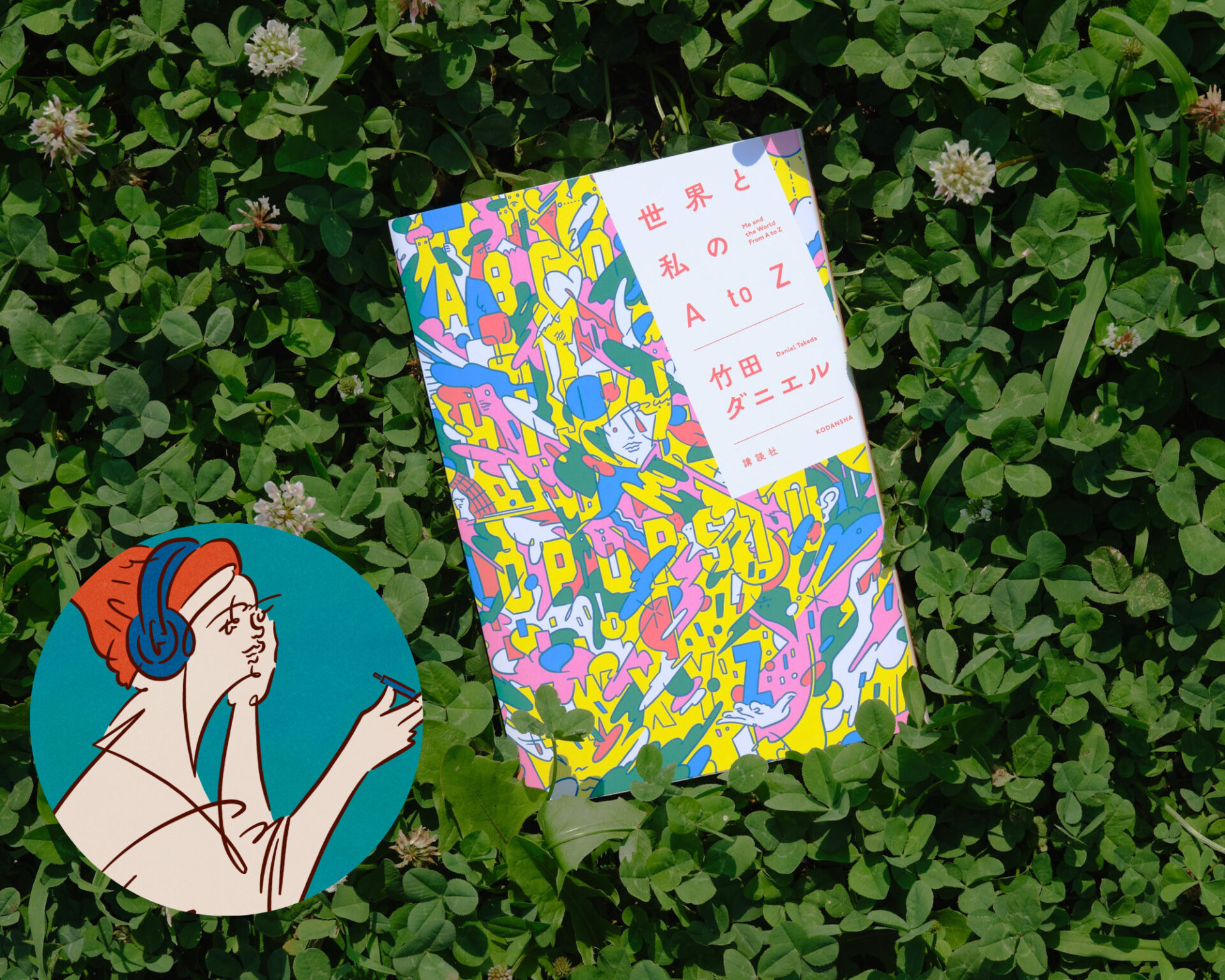Hardly a day goes by without hearing the term Generation Z (Gen Z) these days.
Gen Z is a generation garnering attention for initiating new cultures, beliefs and values.
Although the older generations tend to look upon Gen Z in a hopeful light, the truth is that there are some realities that are not necessarily so. There are also differences between the Gen Z in Japan and those in other countries.
So what are the beliefs and values that define Gen Z and what kind of shikohin do they enjoy?
As a Gen Z writer in Japan, we spoke to Daniel Takeda, a music agent, writer and author of “Sekai to Watashi no A to Z” (The A to Z of Me and the World) who writes about the realities of Gen Z in the United States as a Gen Z himself.
The article will introduce the core philosophies of the U.S. Gen Z and how the shikohin experience has changed with the current times.
(text: Kei Hayashi photo: Kyotaro Nakayama edit: Neko Sasagawa)
Gen Z’s self-love as a form of self-preservation

ーー What do you think are some of the things that characterize Gen Z in the U.S.?
Although some interpretations vary, Gen Z is usually defined as the generation of people born between the mid-1990s and mid-2000s. This generation has experienced the coronavirus pandemic in their middle school or high school years. They grew up experiencing certain historic events first hand, such as the inauguration of the first black president, mass school shootings, and the legalization of same-sex marriages, and all the social influences that came with them.
The term Gen Z has recently started being used in Japan more often as a marketing trend, but the American term of Gen Z is an extension of the values and beliefs that were fostered by the Boomer generation (born between 1946 and 1964) and Millennial generation (born between 1981 and 1996) that came before them.
When talking about Gen Z, one must not look at it simply as groups separated by age. In order to understand how and what has led to the current beliefs and values of Gen Z, I think it is important to trace the background and context that led up to our current society.
This is strictly a discussion on trends and does not imply that all young people share Gen Z beliefs and values. There are people who are outside the age bracket of the Gen Z definition that identify with Gen Z values as well.

ーー One belief that is often associated with Gen Z is the importance of self-love and self-care. In Japan, there seems to be a strong marketing connotation associated with the generation as a way to promote luxuriously spending on yourself. How do you think Gen Z’s concept of self-love can be best explained?
Self-love in the U.S. is also often interpreted with commercial motives, such as buying something for yourself as a treat. However, recently there has been more discussion and an update on the values behind such concepts. There is a growing recognition of self-love and self-care as something that is more along the lines of treating and taking care of yourself just as we would your friends and family.
In Japan, there is a cultural understanding that being humble and not disrupting the harmony of the group is virtuous, so the lines between self-love and being selfish are more complicated. However, to give a more simple example, self-care can be something as simple as declining an invitation from someone if you are too tired to attend. Not sacrificing your needs for the sake of humility is also a form of self-care.
The lockdown caused by the coronavirus pandemic was one of the reasons why the discussion of self-care took off in the U.S. As people were restricted from going out and anxiety and depression increased among the population, people started talking about mental health in the same way they talk about physical health.
The coronavirus pandemic also highlighted some of the problems with racism and the political system in the U.S. and self-love and self-care was one form of self-preservation in a society where people felt they were not being taken care of.

Social media in a society where young people cannot physically get together
ーー With the spread of social media, the place for young people to gather has expanded beyond the physical world and into the online world. It seems to have become more complicated and difficult to grasp the feelings of loneliness in people because they may post glamorous and positive images on social media while feeling anxious in real life. How do the youth in the U.S. handle such hidden feelings of loneliness?
This trend is sometimes referred to as a loneliness epidemic. Although the use of smartphones and not having enough real-life contact with others is often blamed for loneliness, I believe there is a deeper social issue at hand.
While people were not able to go to school during the lockdown, TikTok videos posted by young people showed that many people were sharing the same stressful emotions and it created a sense of connection and understanding. For minorities living in more conservative neighborhoods, social media offers them a way to connect with other minorities living far away. There are a lot of human connections that are made possible through social media.
In terms of the decline of real-life interactions, this is largely due to the disappearance of third spaces where young people can hang out in the real world.
In movies and tv shows from the 1990s, we often see scenes of young people hanging out at bowling alleys or at malls, but there are few places available today where people can hang out for extended periods of time for a cheap price.
Many restaurants and bars only allow groups to stay for up to 50 minutes, and it is not uncommon for police to be called because of complaints that young people, especially people of color in the suburbs, are making a ruckus. With the rising occurrences of mass shootings, there are very real social issues present that restrict real-life interaction.
ーー Compared to the older generations, would you say that the current capitalist environment is making social gatherings unaffordable for many and that the deterioration of public safety is making young people spend more time in solitude?
Yes. The U.S. has always been a society where people need a car to get around and it has always been difficult for people to take public transportation or walk in order to get together with others. The current social environment is an additional blow to that problem. In such an environment, social media has become an important place for people to connect.

YOLO, a concept that spread among a generation who experienced a close encounter with death
ーー While people are living in more solitude, there is a concept that is spreading among the younger generation called YOLO (you only live once). What do you think is behind this trend?
I believe that YOLO can be defined under two different contexts.
One is YOLO that comes from FOMO (fear of missing out). On social media we are overexposed to the daily lives of everyone else, and even a casual post by someone can make us feel left out, uninvited by friends, or think that other people are living more fulfilling lives than our own. There is YOLO that comes from the pressure that arises from feeling the need to always be active in order to shine as brightly as everyone else.
The other YOLO comes from a feeling of desperation. Events such as the massive loss of jobs during the pandemic or social injustices being brought to light, and the daily flow of devastating news on environmental and economic issues have made people feel like the world is falling apart, so they might as well do whatever they want.
Although it may be to a lesser degree, I think that the young people in Japan today have less hope for the future than the older generation who lived through the economic bubble years when they were young.
In the past, there was a common belief in the U.S. that if you worked hard and set long-term goals you could persevere, save money and buy a house. However, the difficulty of saving money and buying a house under the current circumstances is drastically different from the past. When faced with this reality, young people become too focused on the present and feel that everything is already hopeless.
ーー Today’s youth are faced with a harsh reality of living in a society where hard work does not necessarily pay off.
In addition to that, the coronavirus pandemic made death a very real reality for them. The idea that we will all die someday became imprinted in the minds of young people at a very early stage in their lives.
I believe this is one of the reasons why Gen Z is sometimes referred to as the generation of despair.
The rapid rise of prices and inflation is another factor for their despair. When faced with the high price of a cup of coffee, people often say “The price is ridiculous, but YOLO.”

The background of the sober curious movement
ーー At DIG THE TEA we dig deep into the topic of shikohin. There is a trend among young people, especially Gen Z, to choose not to drink alcohol. What is behind this so-called sober curious movement?
It’s true that there are more people who are choosing not to drink alcohol and I believe it comes from the backlash of the excessive drinking culture of the mid-2000s to the mid-2010s.
If you look at music from that time, there are many hit songs that sang about the glamor of excessive drinking and partying. However, the celebrities that were behind such culture later came to reveal that they suffered from alcohol and drug addiction behind the scenes.
In the wake of the overly glorified drinking culture, a belief that we should respect an individual’s choice not to drink alcohol became more widespread. I think the term sober curious is not originally a term used to describe people who don’t drink from the start, but a term used to express kindness and understanding toward people who suffered from addiction or alcoholism to help them recover from it.
In the past when someone said they don’t drink they may have been mocked, but now we have reached a point in society where it is the people who mock other people for not drinking who are seen as ethically unsound.
ーー Does this mean that the culture of seeing the inability to drink alcohol as lame is disappearing?
Yes. Of course there are still young people who enjoy drinking. There is simply more understanding towards people who have different experiences, conditions, or have made certain decisions about drinking and people show respect for that.
Recently there is a matching app where users have the option to show the amount of alcohol they enjoy drinking. In the past, many people went to bars for their first date, but recently more people are choosing to go to coffee shops instead.
Nonetheless, there are still social occasions where alcohol is enjoyed as a shikohin. For example, many people enjoy drinking at concerts and if they choose to go to a bar most people would rather drink something fancier than a soda.
To provide newer options for such occasions there are products such as non-alcoholic drinks in fancier cans that look like alcohol, and many bars now commonly serve mocktails.
As the values of society changes, new shikohin besides alcohol is emerging in various ways.

Two contradicting trends, vintage clothes and fast fashion
ーー Vintage and second hand clothes are growing in popularity among Gen Z and younger people in both the U.S. and Japan. What do you think is behind this trend?
While I think that some people choose second hand clothes as a form of environmental and anti-capitalism activism, I believe a major factor is that the negative image of associating used clothes with poverty has dissipated.
In fact, given our current social and economic circumstances, the idea that poverty is self-inflicted or blamed on the individual has changed entirely.
Second hand shops are attractive because one can buy quality clothes at cheap prices and find old retro items of vintage clothes. There are many influencers on TikTok and Instagram who share their vintage fashion looks and it has become an easier trend to follow.
ーー At the same time, fast fashion is still just as popular. This seems slightly contradictory?
This is likely largely influenced by social media. In the past, we did not really keep track of what clothes people wore. However, Instagram popularized photo culture and people now keep a record of what they wear each day on their social media accounts. Because of this people do not want to give the impression that they wear the same clothes all the time, so this has had a clear impact on fast fashion.
Trends change at such a fast rate and it is common among young people now to buy new clothes just for the sake of going on a trip or going to a festival. There is a constant sense of urgency for the need to always update yourself.
Fast fashion is a cheap and easy way to provide temporary cover for such anxieties. It makes it easy for people to be fashionable even if they don’t have a lot of money. However, the expiration rate of such fashion is very short. It is the epitome of short term mass consumption culture.

Stan culture is not entertainment but a projection of identity
ーー Stan culture is something that has grown exponentially among all generations in recent years. Is there a difference in stan culture of the U.S. and Japan?
Although stan culture exists in both the U.S. and Japan, I believe they are slightly different in its essence.
Stan culture in Japan is often categorized as entertainment or a way of escaping reality and a way to increase happiness in your personal life. Of course there are interactions among the fans, but the most important aspect is the relationship between the fan and the celebrity itself.
On the other hand, stan culture in the U.S. is more about connecting with other fans based on shared values and expressing that you share the celebrity’s or artist’s ideologies or politics.
Beyonce, Harry Styles, Billie Eilish, Taylor Swift, and other artists all have a fan community with its own culture, and to some extent they share common tastes in fashion, lifestyle, social values, and ideology with their fans.
ーー Does this mean that fans use celebrities as a way of expressing their voice and values in life?
I think many people gain a sense of identity through the act of supporting certain celebrities or artists.
For example, Phoebe Bridgers is an artist who is openly queer and sings about her mental health. She has many fans who identify as queer and having mental health issues and the fans even make self deprecating jokes about it.
However, this is different from viewing celebrities in a godly way, which is often characterized by an intense pressure for celebrities to be perfect and not make mistakes. The current trend is slightly more relaxed.
In Europe and the U.S. in the past, it was very common for rock stars to do drugs and have extreme beliefs, but in that sense our current trends do not expect so much or put celebrities on such a high pedestal. Stan culture accepts that celebrities are humans that make mistakes and the fans consider it their personal choice to follow them.
I think it is a positive and healthy trend that people are not treating celebrities and artists as perfect beings or some kind of saint, but rather identify with their imperfections and empathize with their humanity.
Gen Z beliefs and the future

ーー To finish off with a grand question, how do you think our society will change in the future due to the beliefs and values that have emerged with Gen Z?
Although it would be nice if Gen Z can realize what the media portrays of them, such as bringing about social change and the creation of new systems that previous generations failed to accomplish, I don’t think it would be so easy.
There are still many unavoidable forces in our society that cannot be changed with just the power of young people alone. I personally believe that the core mindset of this generation will be to try to maintain the current status quo and prevent society from deteriorating any further.
On the other hand, there are also real positive changes that are taking place. The fact that the voices of young people are being heard more than before and that we are openly able to talk about the problems of society is a significant change that has significant meaning when we think about the future.
The shift in mindset from believing that one must wait patiently in order to receive the benefits of society after they grow up, to believing that even though society is in disarray, we can still take action as a member of society and make a difference, is a very important one that should be cherished.
In other words, looking at oneself as a participating member of society and acting on beliefs that you value yourself may lead to a change in all our futures.
Translation: Sophia Swanson
Editor and creator of the future through words. Former associate editor of Huffington Post Japan. Became independent after working for a publishing company and overseas news media. Assists in communications for corporates and various projects. Born in Gifu, loves cats.
